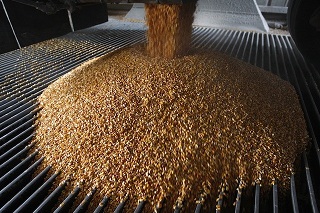The Choice: Feed Your Family or Feed Your Car?
 “U.S. livestock and poultry producers have asked that the federal Environmental Protection Agency waive for the first time the required use of ethanol in U.S. gasoline as the drought has devastated the corn crop, the primary feedstock of the biofuel,” Reuters reported earlier today.
“U.S. livestock and poultry producers have asked that the federal Environmental Protection Agency waive for the first time the required use of ethanol in U.S. gasoline as the drought has devastated the corn crop, the primary feedstock of the biofuel,” Reuters reported earlier today.“The national trade groups for beef, chicken, pork and turkey producers said they have petitioned the EPA administrator Lisa Jackson to waive for a year the mandate to blend ethanol into U.S. gasoline, said Tom Super, vice president of communications at the National Chicken Producers Council.” Although, it was noted that, “The EPA has not granted a waiver since the fuel standard was enacted in 2007. About 35 percent of the U.S. corn supply is now used to produce ethanol—about the same amount that is used as animal feed, according to the U.S. Agriculture Department.”
Commenting on the same story, The Guardian said, “research published last week by the New England Complex Systems Institute [Necsi] warned of an ‘imminent food crisis’ because of the diversion of corn stocks to ethanol. ‘Necsi has warned for months that misguided food-to-ethanol conversion programs and rampant commodity speculation have created a food price bubble, leading to an inevitable spike in prices by 2013. Now it appears the ‘crop shock’ will arrive even sooner due to drought, unless measures to curb ethanol production and rein in speculators are adopted immediately,’ the researchers warned.”
Back in May 2006, Business Week observed that, “Ethanol has three advantages, at least in theory: It’s renewable, it can be domestically produced, and it burns cleaner than gas. The world’s largest producers of ethanol are the U.S., which makes it primarily from corn, and Brazil, which mashes the stuff out of sugarcane.”
But on the flip side, they also noted, “Ethanol can’t travel in pipelines along with gasoline, because it picks up excess water and impurities. As a result, ethanol needs to be transported by trucks, trains, or barges, which is more expensive,” and that can contribute to rising gas prices.
Environmentalists have also had a lukewarm response to ethanol replacement. In his 2007 State of the Union address President Bush called for reducing gasoline usage, in part, by switching to ethanol. But NPR reported at the time that some environmentalists “question the practicality and sustainability of the corn-based fuel.”
NPR quoted Dan Becker, director of the Sierra Club Global Warming and Energy Program, as saying, “With ethanol, the devil is in the details…There are ways of making it that are quite clean, but that’s not the way we’re doing it…The way we make ethanol now…involves seven passes over the field with a diesel tractor, heating the corn to convert it into ethanol, and transporting the fuel in diesel-guzzling trucks.”
And in July 2010, CBS News said, “There’s not much that environmentalists and the people who run giant animal feedlots can agree on, except when it comes to the $6 billion the government hands over annually to the ethanol industry…all six of the country’s big meat lobbying groups called for the Senate to get rid of both the generous tax subsidies for corn-based ethanol and the import restrictions on foreign ethanol. And today environmentalists are busy touting a Congressional Budget Office (CBO) report that backs up what they’ve been saying for years—that government support of ethanol is an expensive, energy-intensive way to reduce greenhouse gas emissions that doesn’t make much economic sense.”
At the time, CBS also noted that despite, “all the lobbying heft wielded by large meat companies and other food interests, it still can’t hold a candle to the combined political power of corn growers and oil companies, who are the ones who actually receive the [ethanol] tax credit.”
Until now, that is. Rising food costs are a strong new weapon that the meat and poultry producers can wield and it’s one that will resonate with consumers
You can return to the main Market News page, or press the Back button on your browser.

